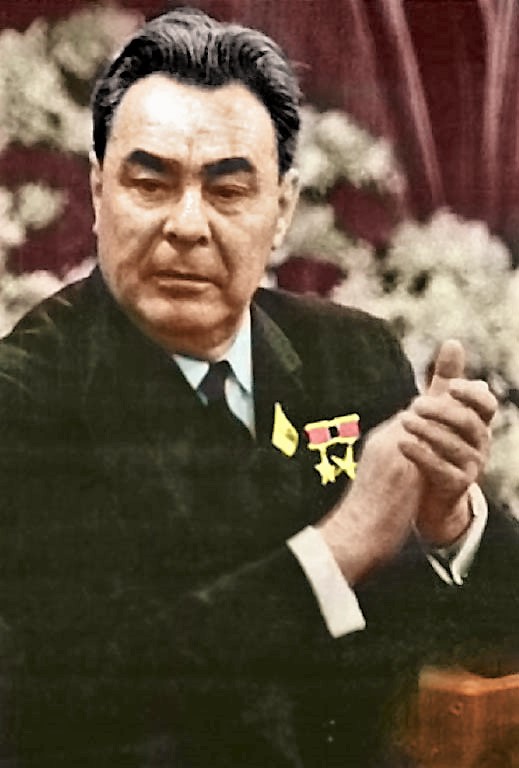En inglés, idioma del que traduje:
** «Each Communist Party is free to apply the basic principles of Marxism, Leninism and of socialism in its country, but it cannot depart from these principles (assuming, naturally, that it remains a Communist Party)».
Fuente: Discurso pronunciado después de la invasión de Checoeslovaquia el 15 de julio de 1968. http://www.beersandpolitics.com/discursos/leonid-brezhnev/brezhnev-doctrine/896
Leonid Brézhnev Frases y Citas
Leonid Brézhnev: Frases en inglés
As quoted in Soviet Strategy and the New Military Thinking (1992) by Derek Leebaert and Timothy Dickinson, p. 68
Reported as false in Paul F. Boller, Jr., and John George, They Never Said It: A Book of Fake Quotes, Misquotes, & Misleading Attributions (1989), p. 9-10. Falsely attributed to Brezhnev as having been said in a secret Warsaw Pact meeting in either 1968 or 1973.
Misattributed
Cited in Soviet Youth and Socialism http://leninist.biz/en/1974/SYAS228/3.1-Youth.and.Culture
As quoted in Peace, Détente, and Soviet-American Relations : A Collection of Public Statements (1979), p. 222
Cited in Soviet Youth and Socialism http://leninist.biz/en/1974/SYAS228/3.1-Youth.and.Culture
Cited in Fundamentals of Political Science http://leninist.biz/en/1975/FPS559/3.1-The.Dawn.of.a.New.Era-
Cited in Fundamentals of Political Science http://leninist.biz/en/1975/FPS559/3.1-The.Dawn.of.a.New.Era-
as quoted in Kissinger: The Secret Side of the Secretary of State (1976) by Gary Allen
As quoted in Voices of Tomorrow : The 24th Congress of the Communist Party of the Soviet Union (1971) by Jessica Smith, p. 30
Cited in Nations and Internationalism http://leninist.biz/en/1979/NI302/0-Introduction.005
Cited in Socialist Internationalism: Theory and Practice of International Relations of A New Type http://leninist.biz/en/1982/SI507/4.2-Nationalism.in.the.Socialist.Countries
As quoted in Nuclear War: The Search for Solutions (1985) by Leonard V. Johnson, Helen Caldicott, Thomas L. Perry and Dianne DeMille
Speech at the 5th Congress of the Polish United Workers Party (12 November 1968), quoted in The Rise and Fall of the Brezhnev Doctrine in Soviet Foreign Policy (2003) by Matthew J. Ouimet
Cited in Triumph of Lenin's Ideas http://leninist.biz/en/1978/TOLI198/01-Opening.Remarks
Cited in Ussr: For Peace Against Aggression http://leninist.biz/en/1976/UFPAA243/5.1-Against.Spread.of.Fascist.Aggression
Cited in Ussr and Countries of Africa http://leninist.biz/en/1980/UCOA319/01.5.1-Struggle.of.Former.Portuguese.Colonies
As quoted in Selected Speeches and Writings (1980) edited by Mikhail Andreevich Suslov
“The trouble with free elections is, you never know who is going to win.”
This was quoted as an anonymous saying heard in Moscow around the time of the first Russian elections, in Voltaire, Goldberg & Others : A Compendium of the Witty, the Profound and the Absurd (2000), p. 201; it was later attributed to Brezhnev in Brewer's Famous Quotations: 5000 Quotations and the Stories Behind Them (2006) by Nigel Rees, p. 441, but without citations, and it is clearly derived from a statement widely attributed to Vyacheslav Molotov as early as the 1954 Berlin Conference, according to an eyewitness writing in International Affairs Vol. 36 (1960), p. 4 : "The trouble with free elections is that you never know how they are going to to turn out."
Misattributed
As quoted in V karǐni zdiǐsnenoǐ mriǐ (1979) by IE IU Kastelli, p. 54
As quoted in Reprints from the Soviet Press (1977), p. 5
“Soviet people are better off materially and richer spiritually.”
As quoted in Our Friends Speak : Greetings to the 25th CPSU Congress (1976), p. 268
Cited in the Future of Society http://leninist.biz/en/1973/FS375/5.3-Main.Historical.Stages.of.the.Communist.Formation
Statement made in World War II, as a commissar on the southern front, as quoted in Leonid I. Brezhnev : Pages from his Life (1978) by Academy of Sciences of the USSR, p. 49; also in For the Soul of Mankind : The United States, the Soviet Union, and the Cold War (2007) by Melvyn P. Leffler, p. 237
Cited in The WOrld Communist Movement http://leninist.biz/en/1973/WCM485/10.4-Kinship.Between.Right.and.Left-Wing.Opportunism
Cited in Soviet Socialist Democracy http://leninist.biz/en/1968/SSD255/4.6-The.Main.Duties.of.Soviet.Citizens
Cited in Behind the Scenes of Third Reich Diplomacy http://leninist.biz/en/1984/BSTRD194/8-Conclusion
“It is madness for any country to build its policy with an eye to nuclear war.”
As quoted in Indefensible Weapons : The Political and Psychological Case Against Nuclearism (1992) by Robert Jay Lifton and Richard A. Falk, p. 224
Cited in the Future of Society http://leninist.biz/en/1973/FS375/5.3-Main.Historical.Stages.of.the.Communist.Formation
As quoted in Nuclear Disarmament (1979) by Aleksandr Efremovich Efremov
